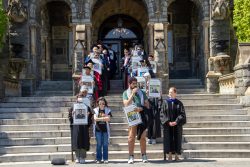When members of Plan A: Hoyas for Reproductive Justice chained themselves to the statue of John Carroll in Healy Circle to protest the University’s sexual health policies last month, alumnus Fiore Mastroianni (COL ’09) wrote on Twitter: “Georgetown administrators negotiate with pro abortion hooligans. Future donations from me: $0.” A few days later, Alexa Rozell (SFS ’11) found her own reason not to give to Georgetown, writing on Twitter: “Like I was going to give any money to Georgetown after grad, but bringing Karl Rove to campus is the nail in the coffin.”
This threat from soon-to-be and recent alumni of not donating to the University is nothing new. Eden Schiffmann (COL ’08), a member of the 2008 Alumni Committee, lived with a group of students who created a Facebook group urging their peers not to donate to Georgetown after they were banned from hosting parties for a semester. Schiffmann ultimately convinced all of the students who started the group to donate anyway.
“Attitudes definitely soften over time as people remember the good times and the bad times recede from consciousness,” Schiffmann said.
Ben Jarrett, Georgetown’s assistant director of advancement, and Heather Greig, director of annual fund marketing and operations, said that most students take a holistic view of their time at Georgetown. Isolated events like the Plan A protest or Karl Rove speech typically do not deter alumni from giving, they said.
Jenny Wyss, the assistant campaign director at University of Virginia’s development office, recently spoke with an alum who would not give to U.Va. because he felt the university had unfairly treated his fraternity. After 10 years, he was finally considering giving.
“I don’t think controversy turns people off [from giving] forever or an extended period of time,” Wyss said.
Wyss said the alum wanted to target his donation toward his school in particular, the College of Arts and Sciences.
At Georgetown as well, donors can chose what their money will go toward, which allows people to eliminate the chance that they will be funding a cause to which they are ideologically opposed. According to Jarrett, 74 percent of donations from seniors this year were to the Georgetown Fund, which is dedicated to providing need-based scholarships to undergraduates.
While efforts are made to make young alumni comfortable with donating, they pose a particular challenge for universities’ development offices, both Jarrett and Wyss said. According to Jarrett, if alumni give three or more out of their first five post-graduation years, they are significantly more likely to become lifelong donors. On the other hand, people who haven’t donated in the 10 years after graduation usually never give, Greig said.
Additionally, because recent classes are so much larger than earlier ones, recent classes account for a large proportion of total gifts received. Last year, the class of 2008 made more individual donations to Georgetown than any other class.
At the same time, Schiffmann believes Georgetown should note how many people are donating and for what reasons.
“The university should consider the underlying reasons for the complaints and take it as feedback,” Schiffmann said.




